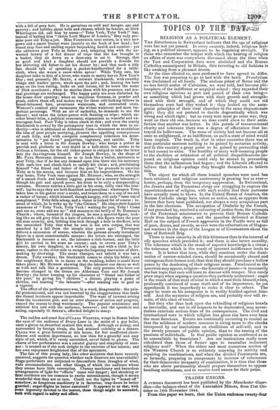TOPICS OF Tntratmtate
RELIGION AS A POLITICAL ELEMENT.
TUE disturbances in Switzerland indicate that the age of religious wars has not yet passed. In every country, indeed, religious feel- ing, as a political element, appears to be regaining strength. To those who remember the temper with which the bearing of religion on affairs of state was everywhere discussed about the time when the Test and Corporation Acts were abolished and the Roman Catholics emancipated in Britain, this reverting to old fashions is like awaking from a pleasant dream.
At the time alluded to, men professed to have agreed to differ. The lion was preparing to go to bed with the lamb. Proselytism was disclaimed on all hands. The zealous priest of Rome and the no less fervid zealot of Calvinism, we were told, had become phi- losophers of the indifferent or sceptical school : they regarded their own religious opinions as part and parcel of their own being— as something which had grown with their growth and strength- ened with their strength, and of which they could not rid themselves even had they wished it : they looked on the anta- gonist principles of their rival churches in the same dispassionate light ; they did not pretend to decide dogmatically which was wrong and which right ; but as every man must go some way, they went on their old one, because no man could show to their satis- faction that another was better. In this parade of transcendental charity and tolerance there was a degree of affectation that be- trayed its hollowness. The mass of society had not become all at once so enlightened, or so indifferent, as such a state of mind would have implied. The truth is, that in other countries there was at that particular moment nothing to be gained by sectarian activity, and in this country a great point to be gained by pretending that it had ceased to exist. The hostility of many well-meaning people to the abolition or relaxation of all political disqualifications im- posed on religious opinion could only be abated by persuading them that the millennium had begun ; and the Liberals affected to believe that it had—perhaps they brought themselves to believe this.
The object for which all these honied speeches were used has been attained ; and religious controversy is growing hot as ever— hotter, perhaps, from the temporary suppression. In Switzerland, the Jesuits and the Protestant clergy are struggling to engross the superintendence of religion, with such avidity that their partisans have actually come to blows. In the United States of America, the Roman Catholic clergy have taken an active, and, as appears from letters that have been published, not always a very scrupulous part in the late elections. The occupation of Otabeite by the French, if not provoked by, received a colouring of justice from, the attempts of the Protestant missionaries to prevent their Roman Catholic rivals from landing there ; and the speeches delivered at Exeter Hall on the subject of French aggression in the Pacific were as full of guns, drums, and swords, as ever were the exhortations of Hugue- not warriors in the days of the League or of Covenanters about the time of Bothwell Brig.
There is more sincerity in all this bitterness than in the interval of oily speeches which preceded it ; and there is also better morality. The tolerance which is the result of superior knowledge is a virtue ; the tolerance which is the result of ignorant indifference leads to vice. It is better that men, while they continue under the domi- nation of narrow-minded views, should be occasionally absurd and outrageous from honest zeal, than that they should purchase a hollow peace by the deadening of their religious sense. Paradoxical as the assertion may appear, religion—the fountain of peace—is necessarily the last topic that men will learn to discuss with temper. Men rarely grow angry when arguing a question they perfectly understand : anger is the result of that state of mind in which a man finds himself,when, profoundly convinced of some truth and of its importance, he yet apprehends it too imperfectly to make it clear to' others. The anger he vents on his antagonist is in reality kindled against him- self. And the mysteries of religion are, and probably ever will re- main, of this class of truths.
But they who thus look upon the rekindling of religious brawls as inevitable, and not in all respects to be deprecated, may never- theless entertain serious fears of its consequences. The civil and international wars to which religion has given rise have ever been the most ferocious. Events are continually occurring to remind us that the mildness of modern manners is owing more to the checks interposed by our institutions on ebullitions of self-will, and to the steady pressure of public opinion, than to the taming of the passions of individuals. Is that public opinion so confirmed as to be unassailable by fanaticism ? Are our institutions really more calculated than those of former ages to neutralize indiscreet religious zeal? When the oldest and most numerous section of the Western Church is so evidently renewing its activity and repairing its combinations, and when the divided Protestants are, as formerly, preparing to compensate by increase of vehemence for their democratic incapacity of combination, it is time that those who are above partisanship should prepare themselves to oppose headlong enthusiasm, and to receive hard names for their pains.


























 Previous page
Previous page